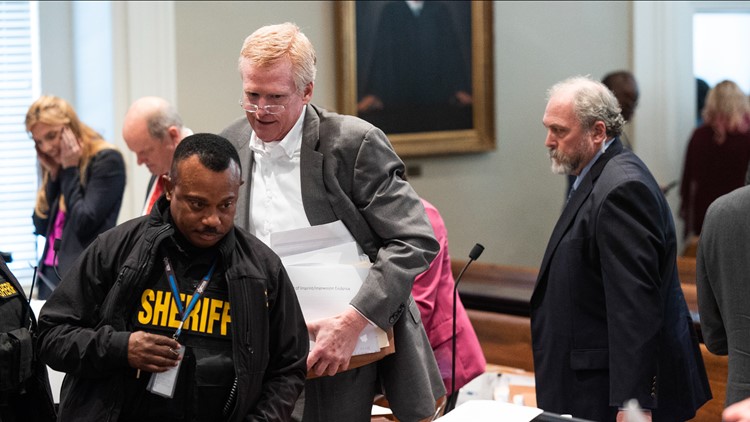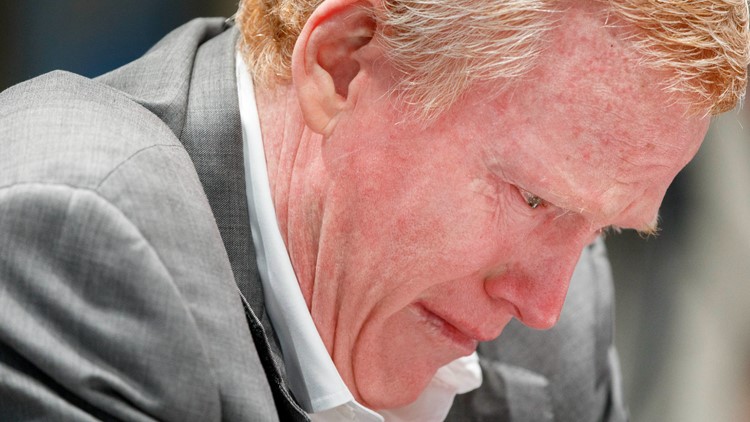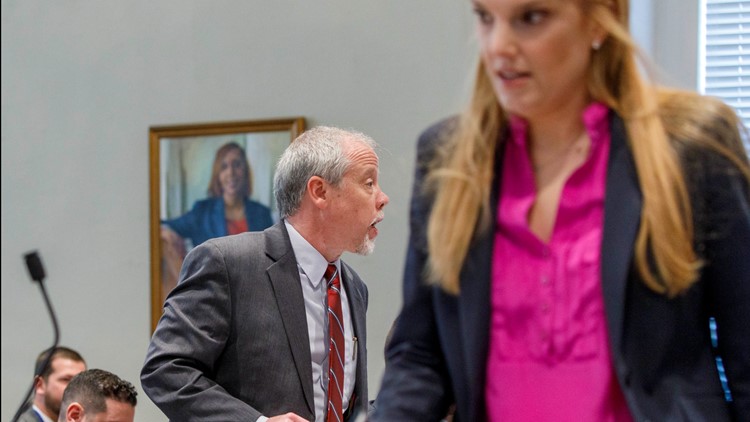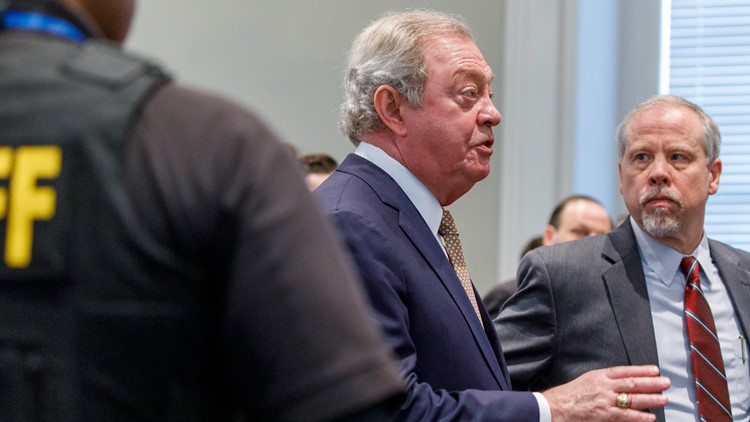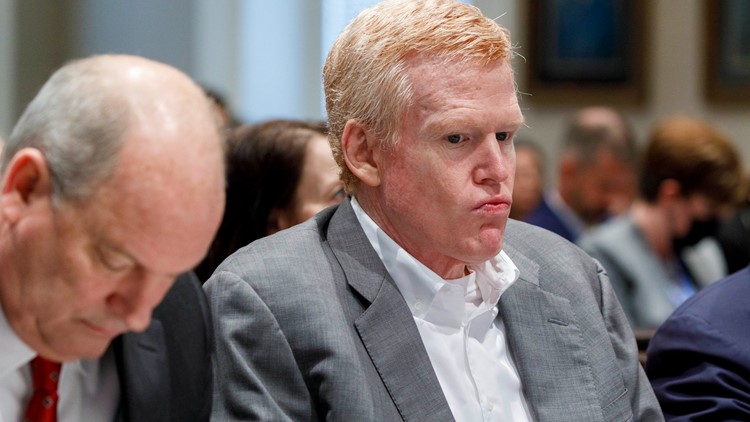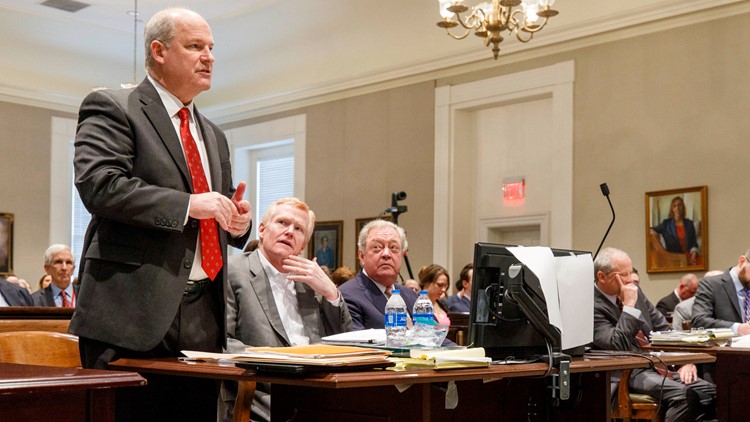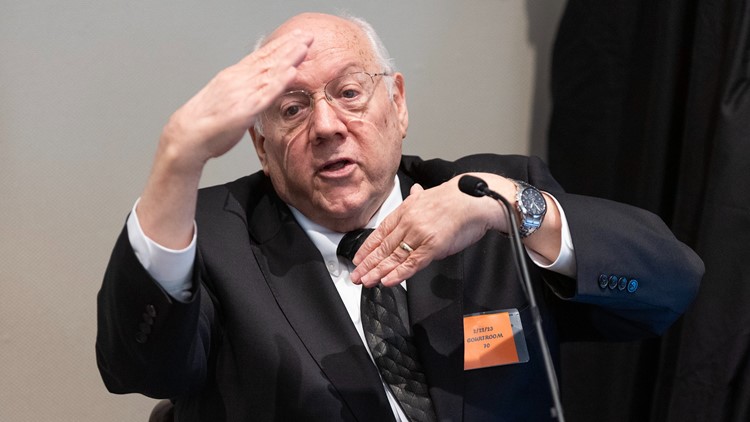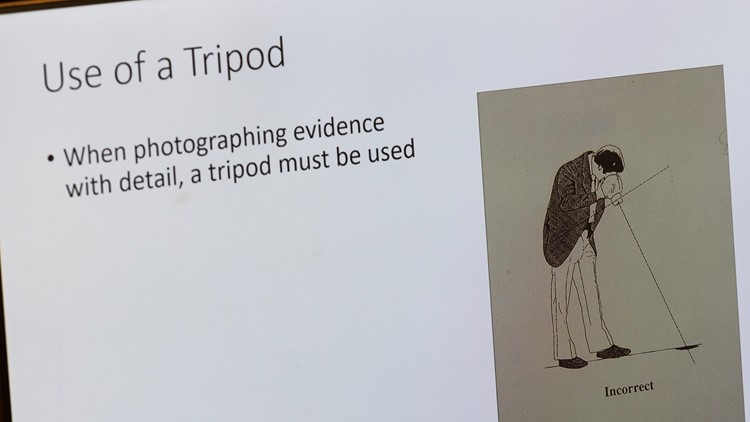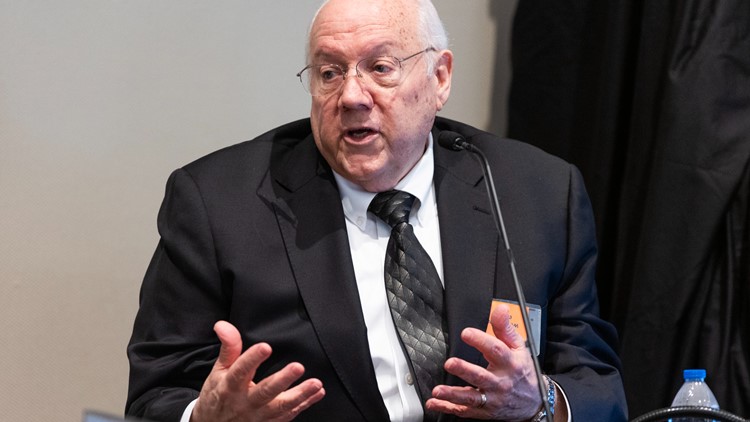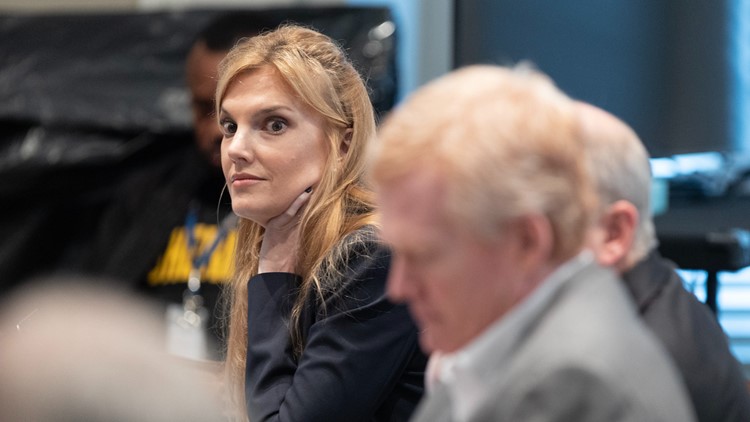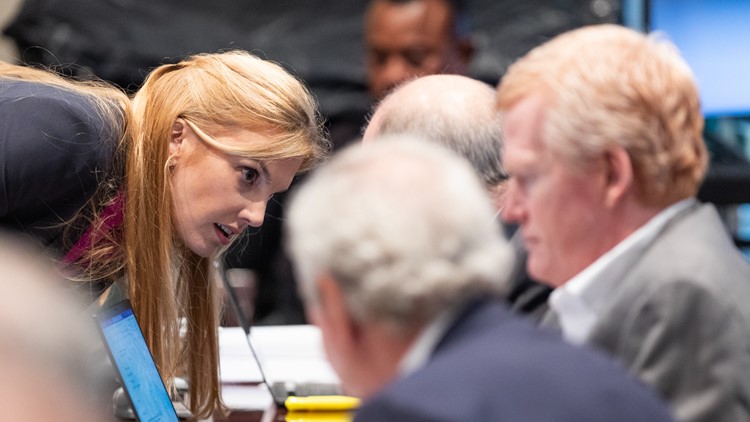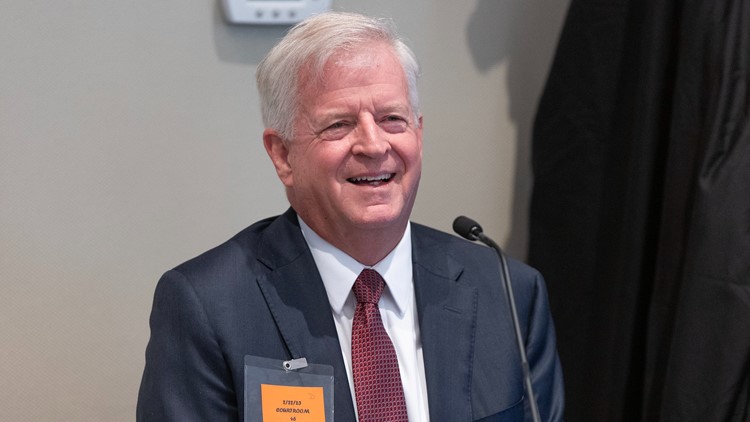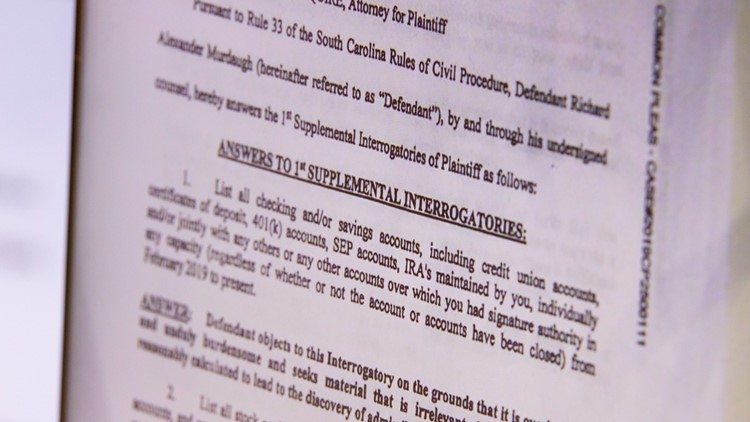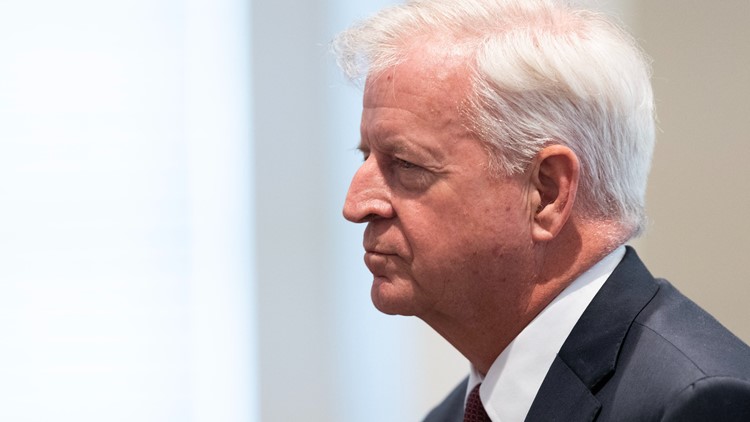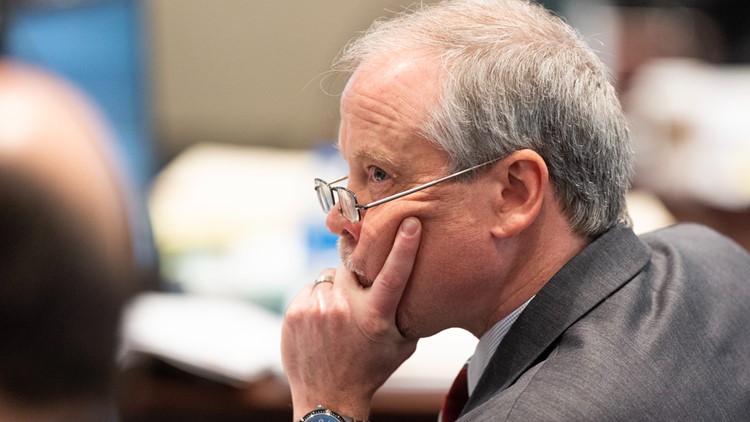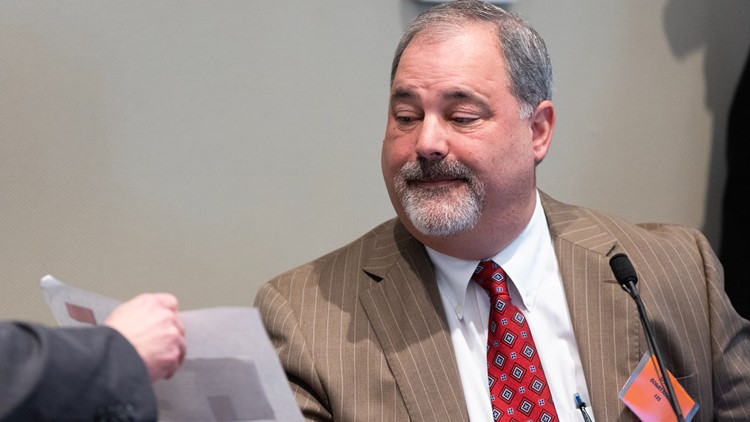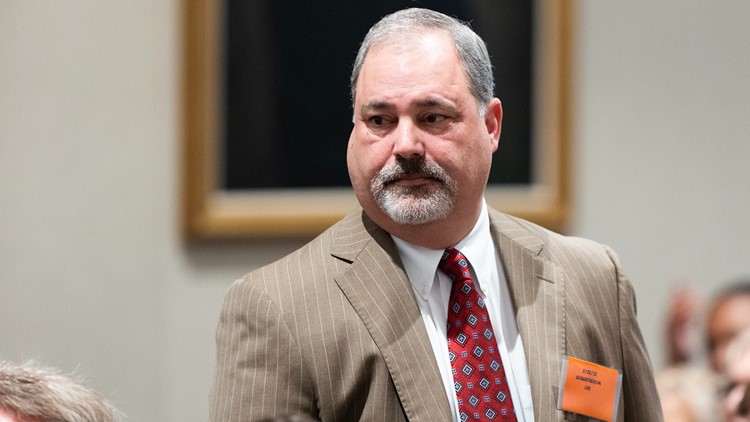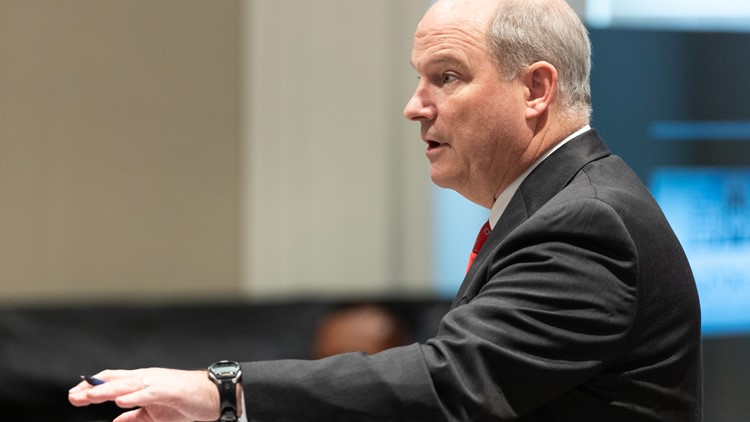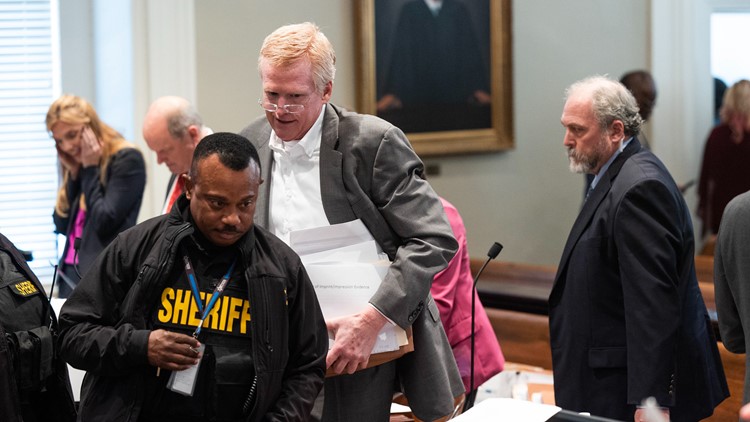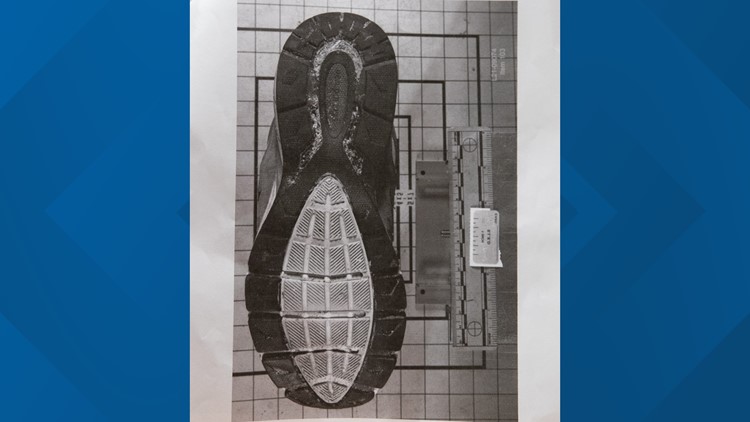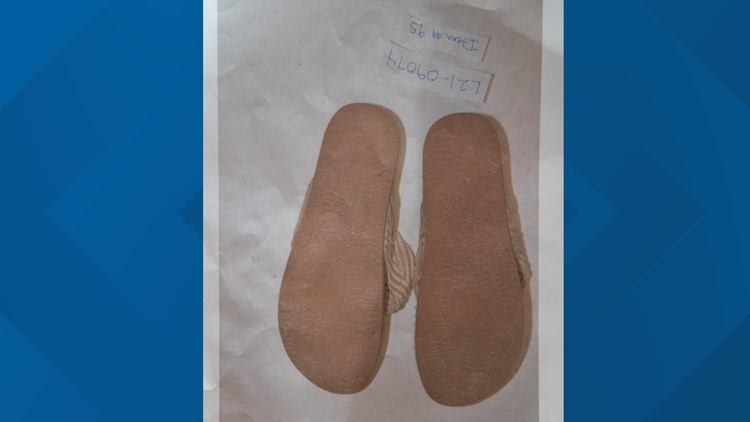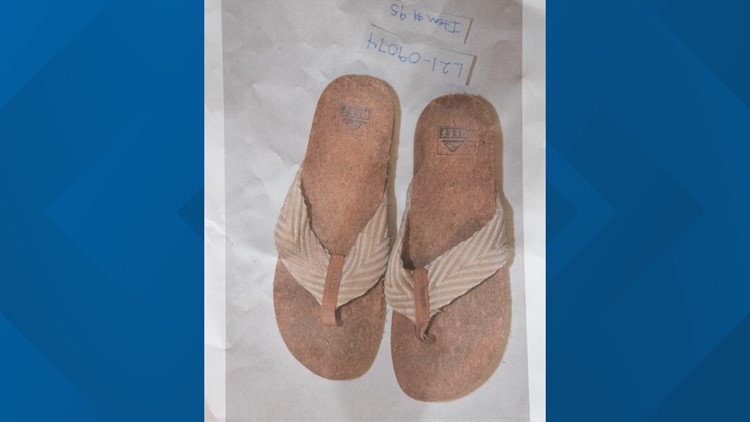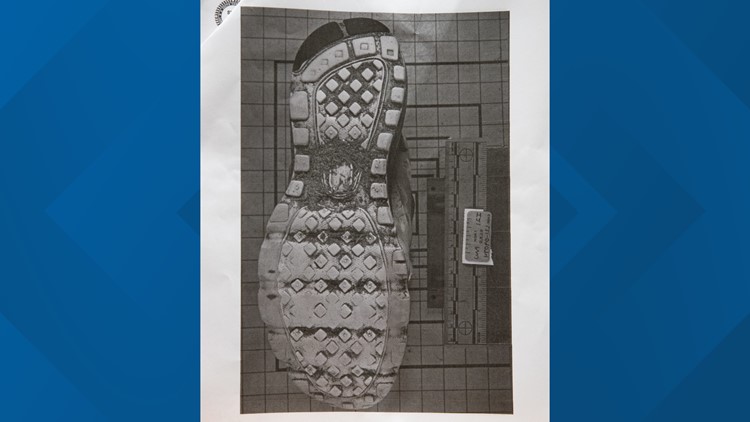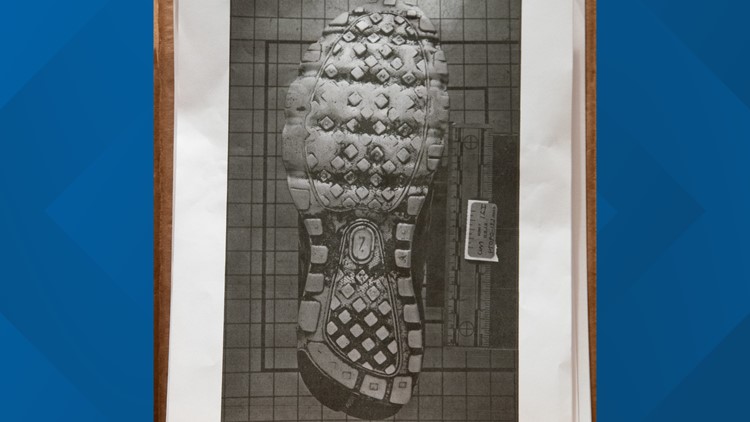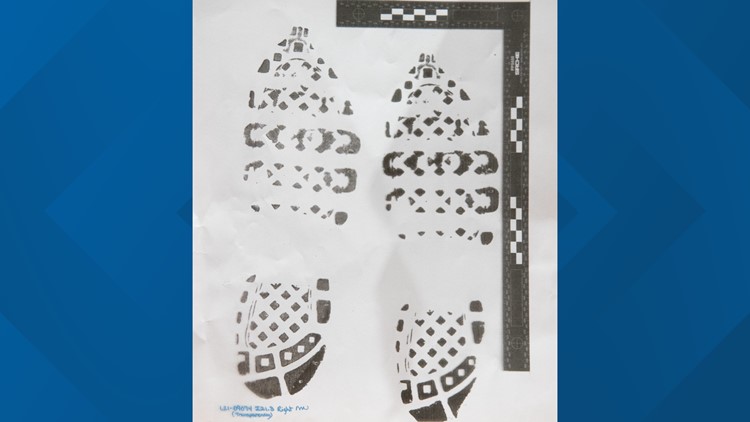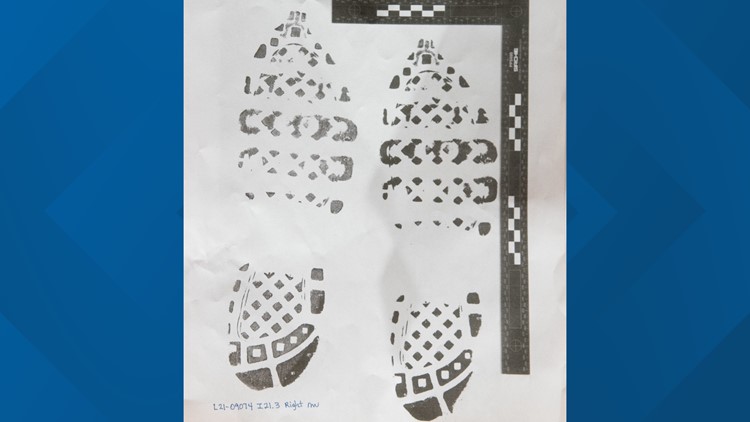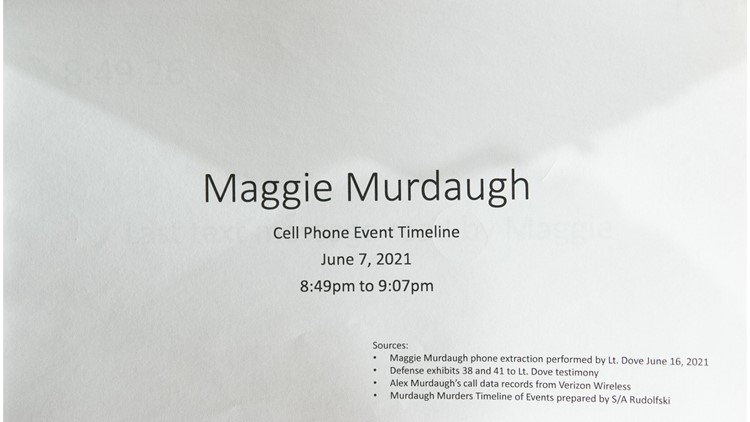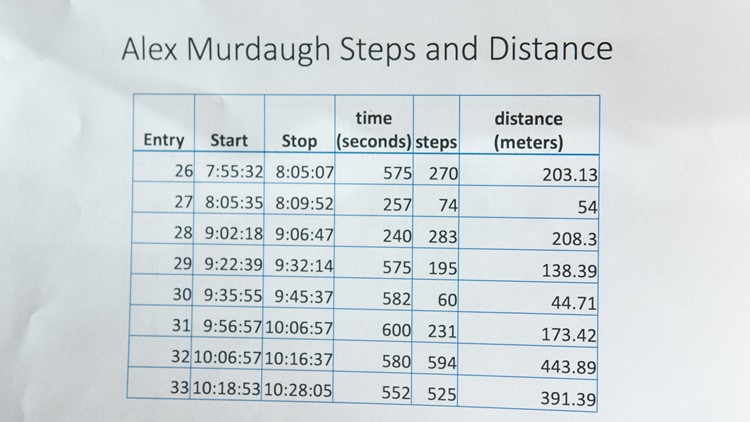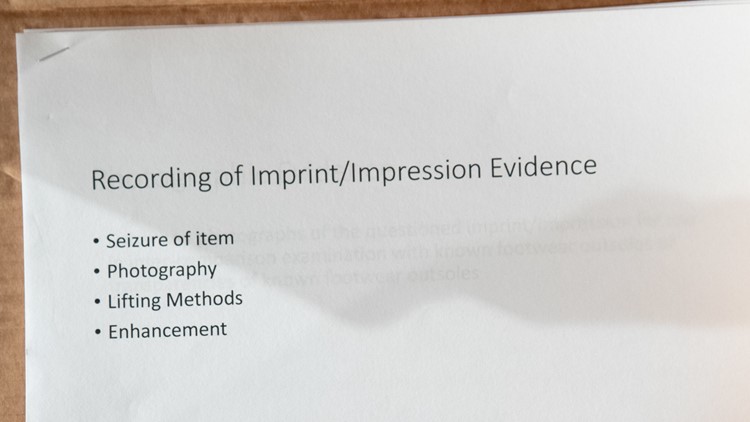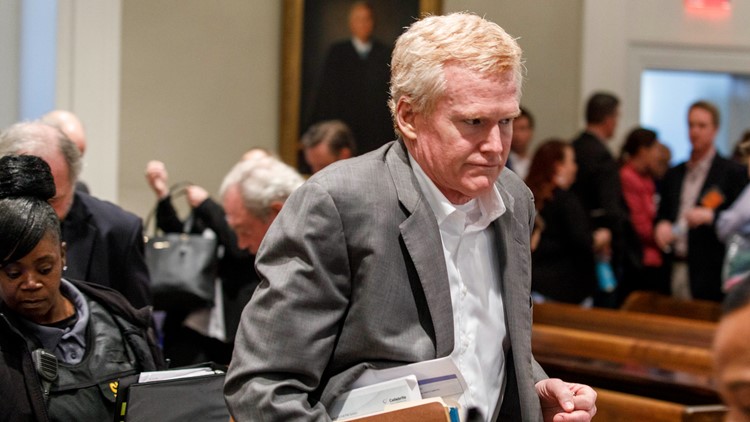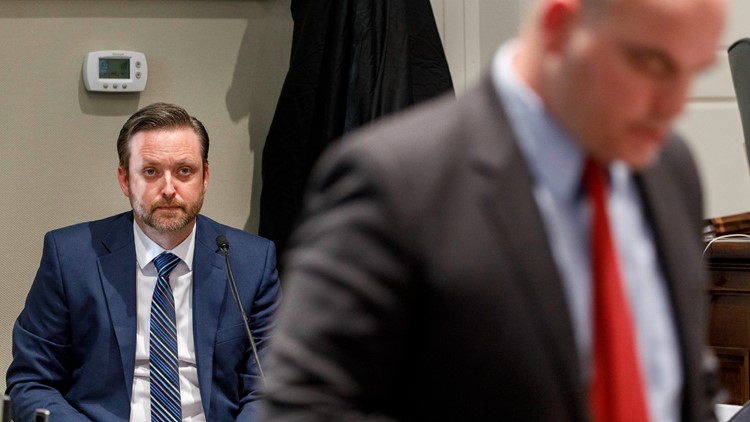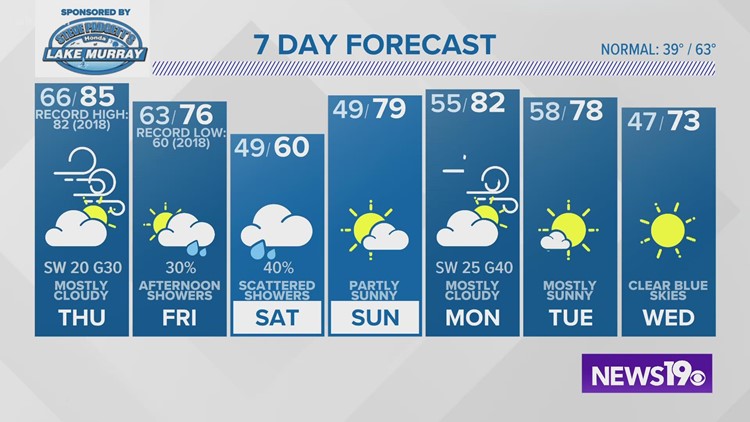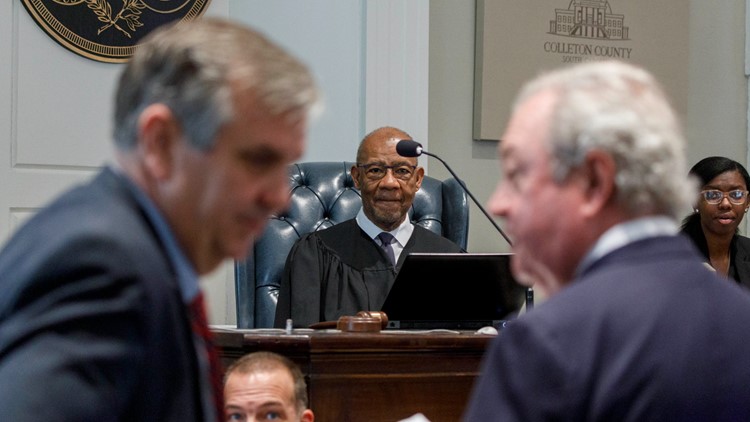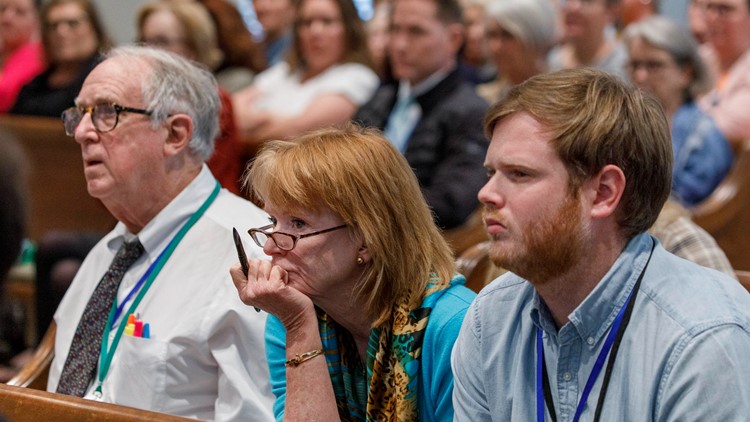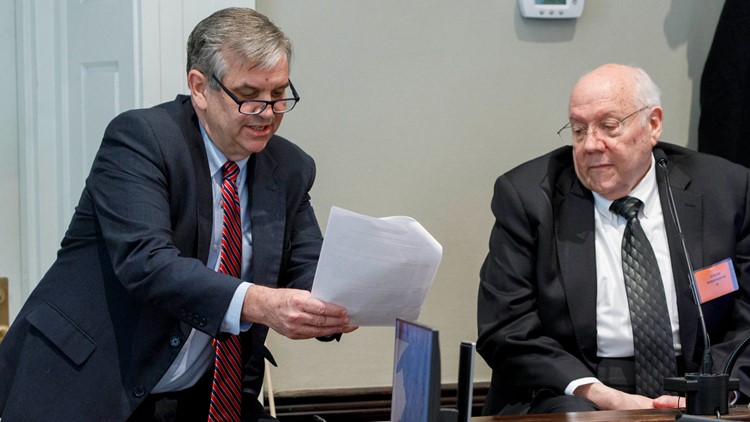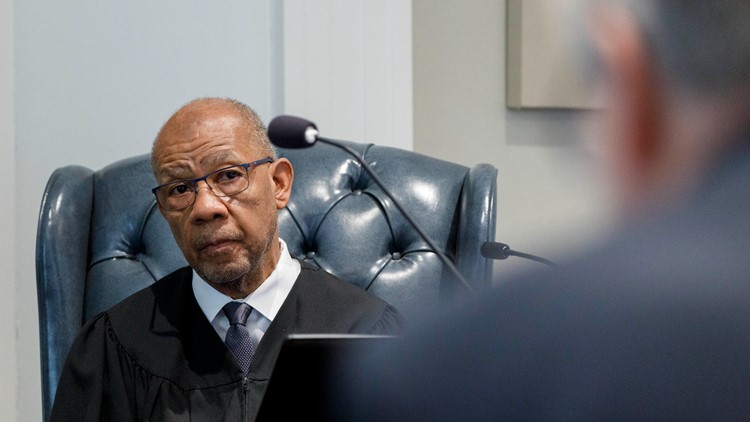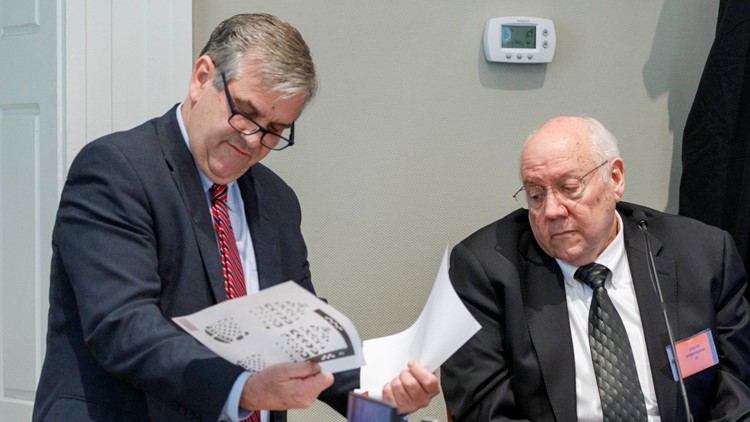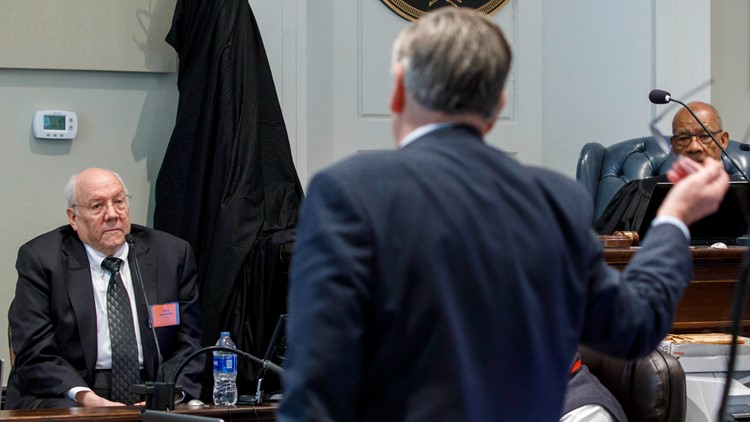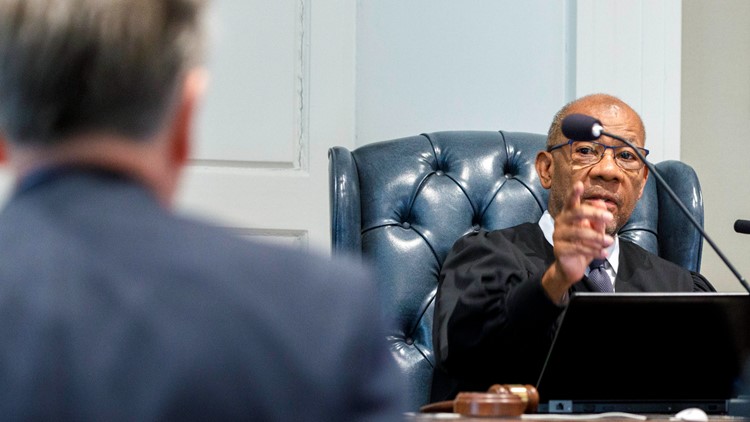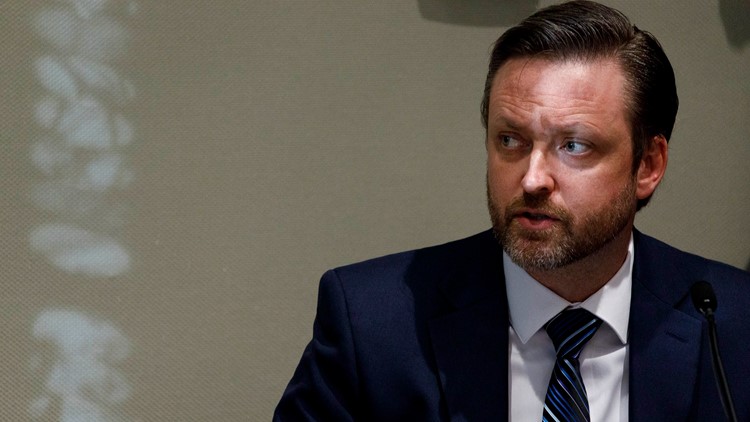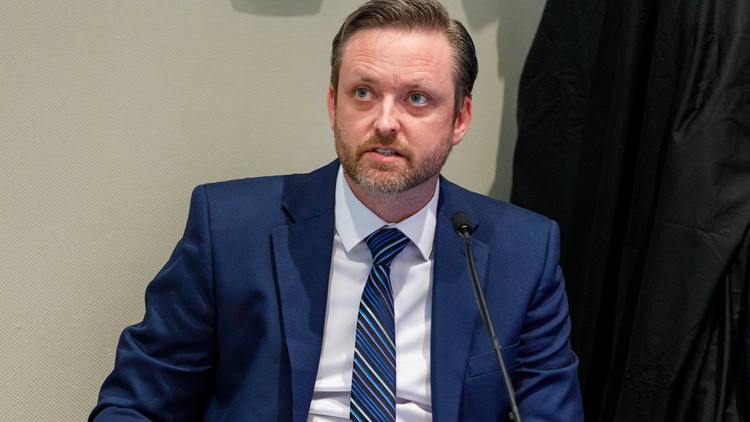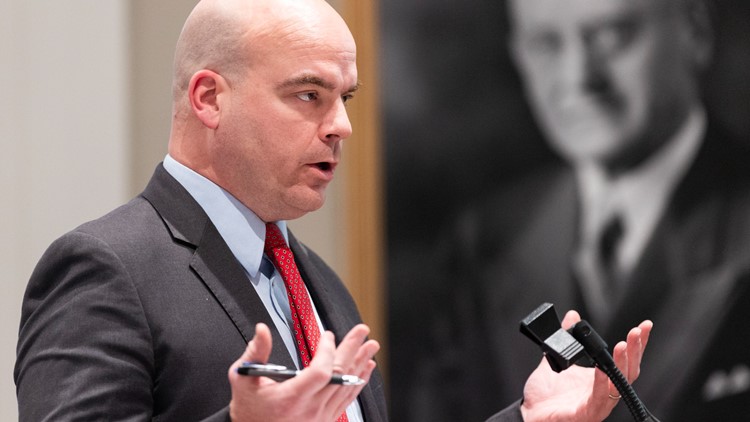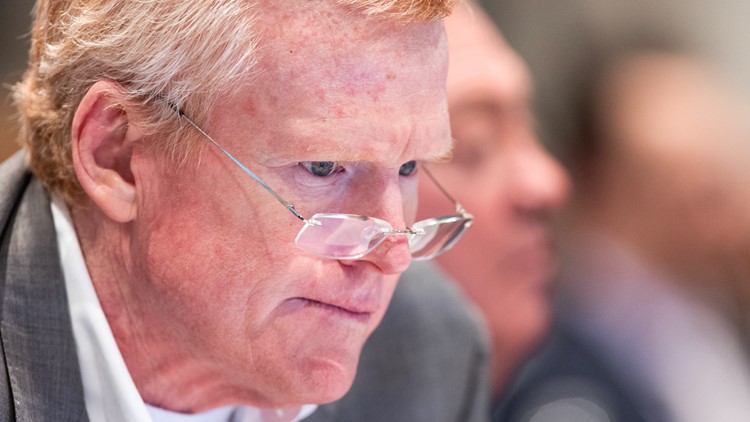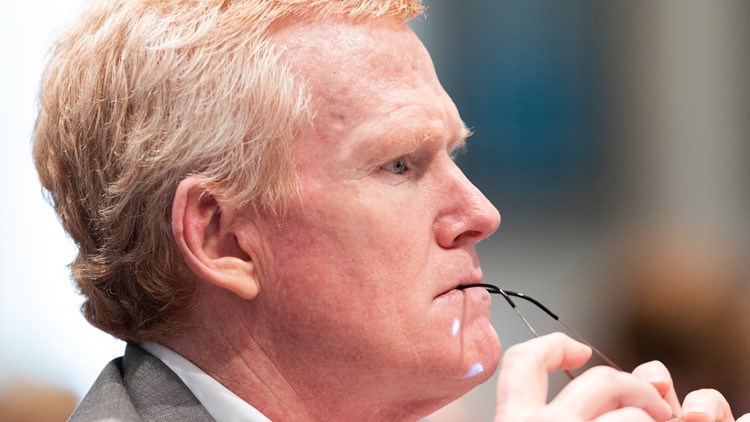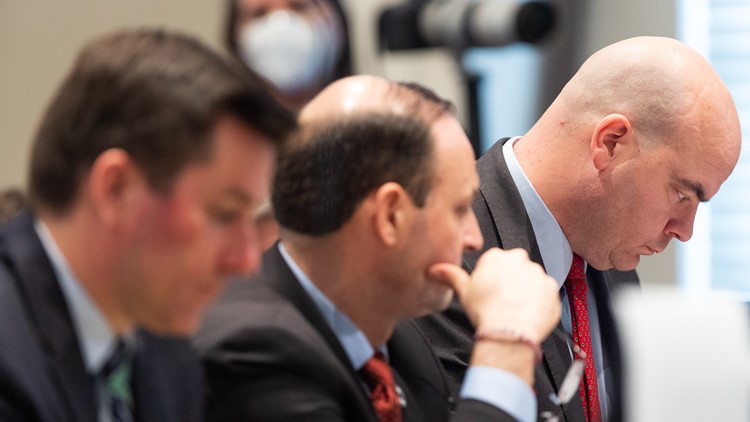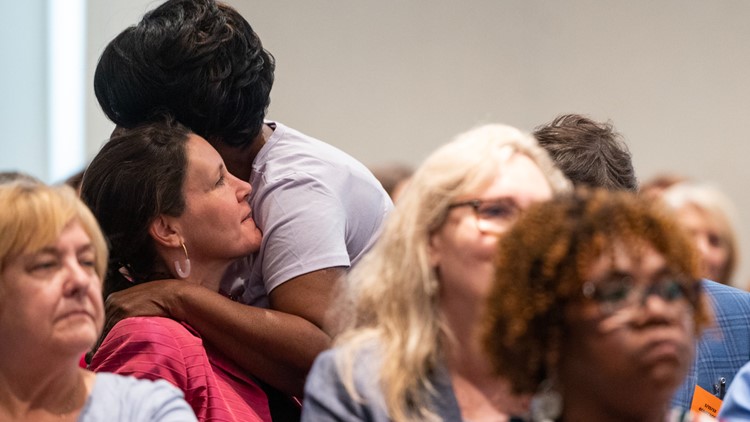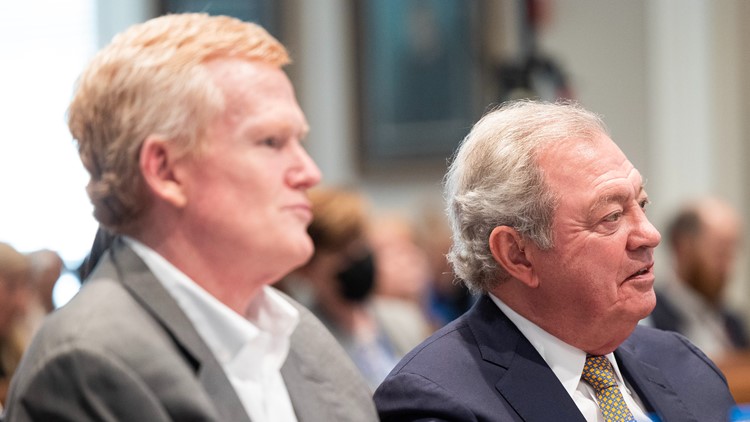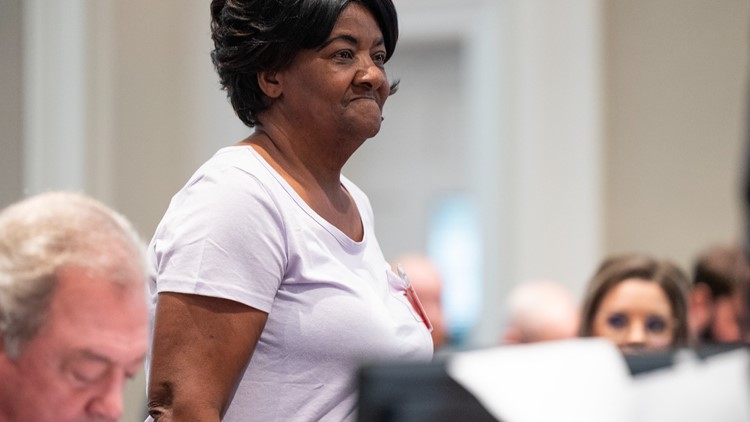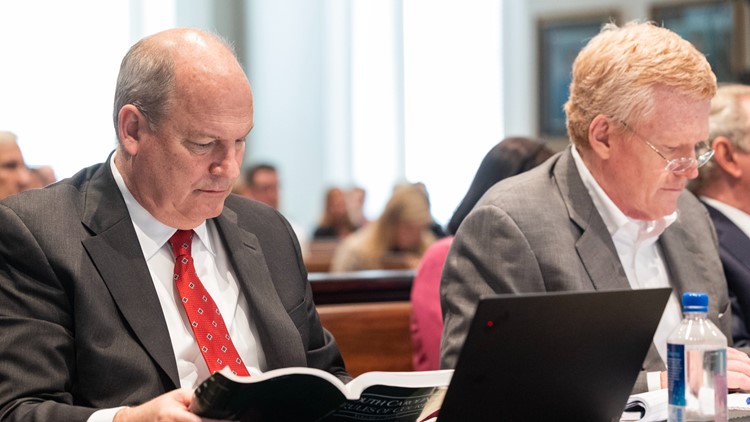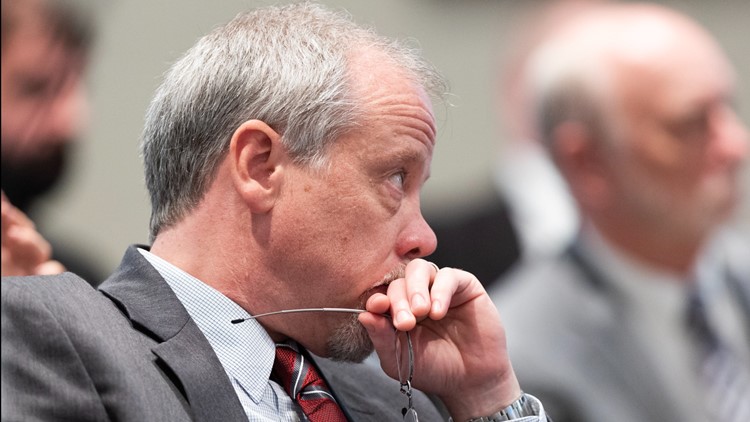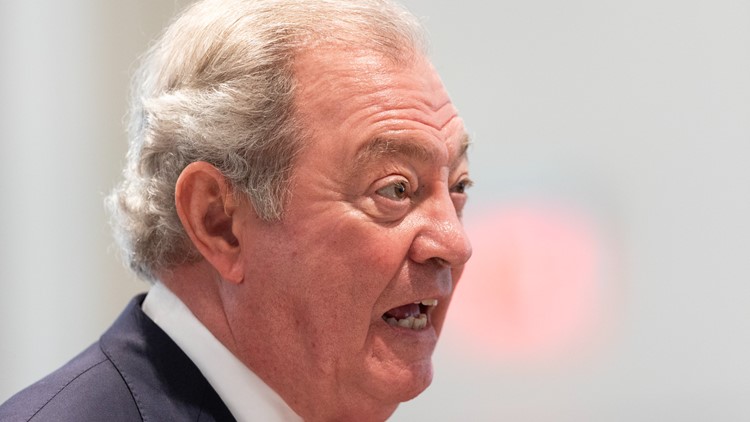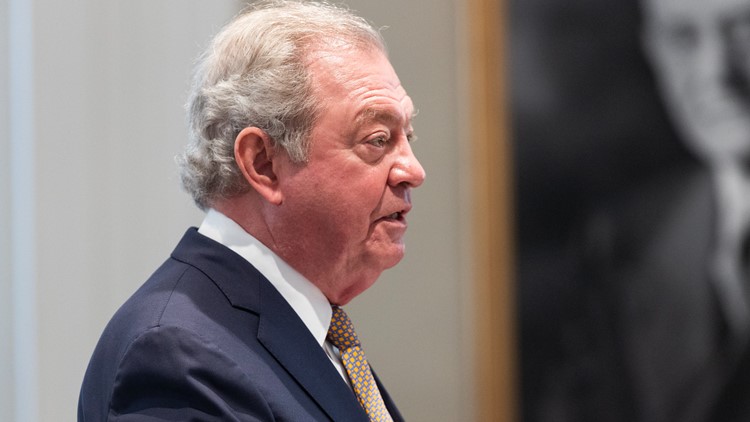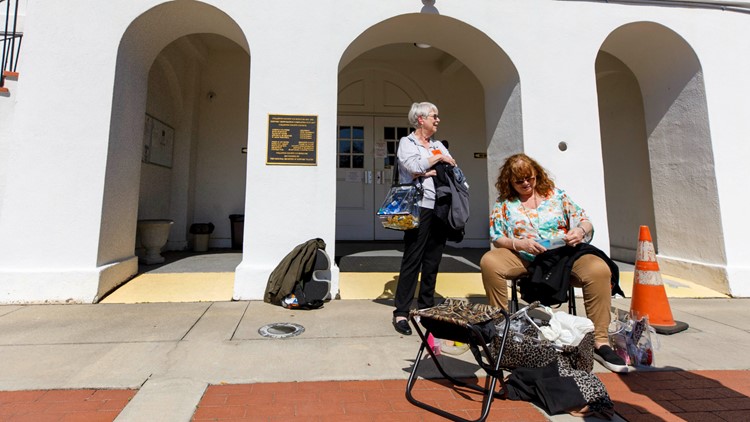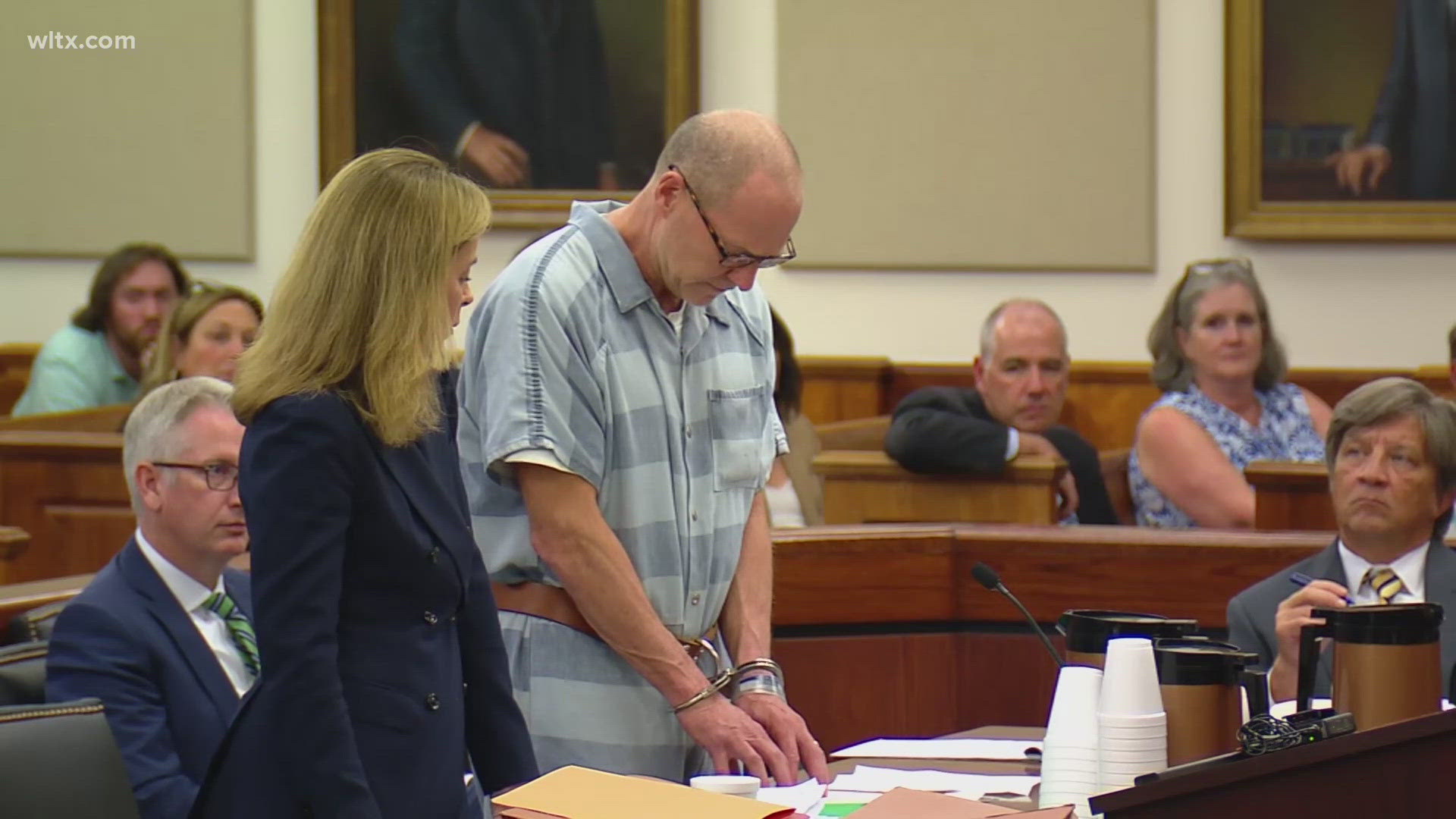WALTERBORO, S.C. — Jurors in the Alex Murdaugh trial heard from witnesses who claim investigators made key errors as they collected evidence on the night of the murders---errors which the defense hopes will cause the jury to doubt its reliability.
Murdaugh is accused of killing his wife Maggie and adult son Paul at the family's hunting property, known as Moselle, in June of 2021. Prosecutors say he shot the pair himself, while the defense argues police and the state rushed to judgment in picking Alex as the suspect.
Murdaugh himself still may testify, perhaps as early as Thursday.
As the day began, defense attorney Jim Griffin asked Judge Clifton Newman to set parameters for the prosecution should Murdaugh take the stand in his defense on Thursday, asking that any financial crimes should be off limits in questioning. Murdaugh is also facing separate trials in the future on accusations he stole millions from clients and his law firm.
Prosecutor Creighton Waters answered that cross-examination should be open to any evidence already presented in court and the defendant would waive any right to set parameters and his credibility could be impeached he has no right to set any self-serving testimony without being questioned cross-examination.
Newman ultimately said he would not limit the scope of cross-examination but would also consult case law.
You can find trial updates here every day. Live streaming coverage can be on wltx.com, on the WLTX+ streaming app on Amazon Fire and Roku TV, and on the News19 WLTX YouTube page.
Wednesday Alex Murdaugh Trial Updates
Mark Ball
Ball is a lawyer with the Parker Law Group, formerly PMPED, and has known Alex Murdaugh for 34 years.
Ball remembers the evening of June 7. Law partner Ronny Crosby called Ball’s wife around 10:30 p.m. that evening and told Ball and his wife about Paul and Maggie and told Ball to go to Moselle. When he arrived, the ambulance was there, along with police and Barry McCoy, the Chief of Police.
When Ball pulled in near the kennels at Moselle, around 10:52 p.m., he said there were no barriers set up to block entrances or the crime scene. He said he raised the question of blocking the entrance to Moselle as people began “piling in.” Ball said he walked around the dog pen and the hangar and outbuildings.
Ball said he stood and watched as law enforcement walked through the crime scene. He said the weather was misty, foggy, drizzling off and on.
Ball said he observed water dripping off the roof off the front of the shed, landing on Paul’s body and draining off the cement slab. He said he was concerned, and thought it was disrespectful to Paul. Ball thought there should be a tarp over Paul, there was one over Maggie.
Ball said between the dog shed and the hangar, he could see Randy and Alex Murdaugh and went to greet them. Ball said Alex went to pieces – he was devastated and crying, and Ball said he tried to console him.
Ball said Alex said, “look at what they did to them.”
Ball said SLED arrived within an hour, by that time all but two or three of PMPED’s law partners and all of Alex’s family were at the scene. Ball said the coroner told them to go to the house and Ball wasn’t sure if it was safe or if the house was part of the crime scene. He said the house did not appear to have been searched when he went inside.
Ball said Sheriff Buddy Hill asked him at the scene if he knew anyone who might want to kill Paul or Maggie and Ball brought up the boat case and threats made to Paul.
Ball names about a dozen people who were in the house at Moselle, standing around in the kitchen and living room. Ball said he and a few others put food in the refrigerator and cleaning up around 2:30 a.m. Ball said he left around 3:30-4 a.m. and returned around 11 a.m. June 8.
When Ball was at the house, SLED took Alex’s clothes and did a DNA swab. Ball said his clothes were wet from being outside in the weather. Ball said the agents put the clothing in bags.
Ball said he went to Moselle and went to the dog pens and went to try and find someone to clean up the dog kennels.
Ball said the crime scene had been released by the time he got there on June 8, so he walked the scene. There were SLED agents on the property. Ball said he went into the feed room and saw there were still biologic remains of Paul that had not been collected and birdshot on the floor and shelves. He saw where buckshot went through the window and asked the agent about it and Ball said the agent told him, “we have all that we need.”
Ball said there was a piece of Paul’s brain remaining and blood and tissue at the scene that morning and that made him furious.
Ball went to the house and Maggie’s father was there and he eventually went to the gun room. SLED agents searched the house while he was there, and Ball was there -- in the room -- while the agents searched the gun room. Ball said he pointed out the 300 Blackout in the gun room to the SLED agents. Ball said there were three shotguns on the pool table in the gun room the night before and told that Blanca had cleaned the room early that morning. Ball said Blanca told him that she was told to clean the room.
Ball said he saw CB Rowe vehicle’s and noticed a jug of Clorox in the bed of the truck and turned the photo over to SLED because he thought it was odd.
Ball said he saw coolers on the property, one open near the outbuildings surrounded by beer cans.
Ball said he was asked to pull Alex’s cell phone records and gave them to SLED and defense counsel.
Ball was asked to identify Alex’s voice on the kennel video and positively identified Alex’s voice, along with Paul and Maggie’s voices. Ball is played the snippet of Alex’s first interview with SLED and believes Alex is saying “they did them so bad” on the video.
Ball is aware of the boating accident and worked on the case. Ball had conversations with Alex on the civil case to begin with, and, later on, the criminal case. Ball said the criminal case was more pressing to Alex. The boating accident, as a whole, was considered a negative to Alex and the Murdaugh family. Ball read the civil complaint and the causes of action against Alex was to get as much insurance money as possible – alleging bad parenting – and Ball thought the case was defensible.
Ball said Alex was forced to resign on September 3, then there was the incident on September 4. Ball said he found paperwork in Alex’s office relating to the boat case that Sunday – checks Alex had deposited that “started this mess with the Ferris case” and a tablet with debts and assets written in it. To Ball it looked like Alex was listing what he had and what he owed.
PHOTOS: Alex Murdaugh murder trial - Day 22 (Wed, Feb. 22)
After Maggie and Paul died, Ball was asked by the coroner to collect Maggie’s jewelry because Ball is longtime friend of the coroner. Ball remembers rings and a diamond bracelet that was in pieces.
Ball is asked about Alex’s relationship with his family. Ball said the person he thought he knew loved his family but after September 3, Ball said he’s not sure he knows Alex. Alex would always take calls from the family. Maggie would post family events on social media. Ball had no idea Alex had an opioid addiction, not sure any of the partners knew. Paul has been demonized in the affair and Ball is upset about it, saying Paul was a good kid. PMPED was a family, they looked out for each other, but Alex betrayed that when he stole the money. No one knows what goes on behind closed doors, Ball said, but the family seemed happy together.
CROSS EXAMINATION by Creighton Waters
Alex was good about hiding who he really was? Yes
You shared a business for how long? Over 20 years
Outwardly, Alex was someone you could trust? Yes. Had a good relationship with his family? Yes
You were asked about the kennel video? I didn’t see the kennel video until a month ago
There is no doubt in your mind Alex, Paul and Maggie are on the video? No doubt
You saw Alex the night of the murders and you knew Paul and Maggie well? Yes
You took Alex back to the house that night? Yes
Sat down on the couch with Alex? Yes
Did you talk to Alex about what he did that night? We talked several times, we talked before the masses came over.
Because you wanted answers? Ball replied, because if the murders were related to the law practice, we wanted to know what was going on. Alex was answering questions properly. He denied he went to the kennels -- he said he ate dinner, sat on the couch, and then went to Almeda -- at least three times that night. Making sure to tell Ball he never went to the kennels that night, Ball said Alex repeated his story front of Ball and other law partners.
Ball said he has heard both that Alex checked Maggie first then Paul, and that it was Paul first then Maggie. The story oscillated, said Ball.
Ball said PMPED was a family. The law firm shut down and went on a high alert after the murders. Ball said he contacted SLED as to what to do about safety. Ball and the partners focused on what happened on June 7. Ball said it appeared Alex was not as focused – didn’t call clients or others trying to get information about Paul and Maggie’s deaths. The night it happened, Ball asked where Buster was, and Alex said Buster was with his girlfriend. Ball asked Alex if Buster needed protection and Alex said he was with his girlfriend.
On July 4, Ball says Alex was seen carrying a pistol in a bag -- and left the bag at the party.
Waters asks Ball about the history of the law firm -- the PMPED law firm was in existence since 1910. In September 2021, after Alex was asked to leave, the firm dissolved and became the Parker Law Group. Alex’s great-grandfather was the solicitor in the area then his grandfather, his father was until around 2012, and Alex was assistant solicitor. Alex kept his assistant solicitor’s badge in the car, on the dashboard.
Ball said the family legacy was very important to Alex and Alex had told him he wanted to be a solicitor someday.
Ball said Randy Murdaugh was at Moselle when he arrived on June 7, and other lawyers began showing up within an hour. Law enforcement was polite and respectful and tried to search Moselle as delicately as possible. The vast majority were very, very polite and responsive to family’s needs – probably too nice, looking back, Ball said.
Ball said Alex would drive his Suburban with his solicitor’s badge on the dash and Ball had heard Alex had a pistol with him at times.
Ball said Alex was on the cell phone all the time, “an obnoxious user.” Ball thought it would be unusual to go anywhere without his cell phone.
As a lawyer, Ball said Alex got good results for his clients; Alex could look a set of facts and know where to push and pull, very good tactically. People were his trade and Alex could be very convincing.
Waters asked Ball, he effortlessly lied to you for years? Yes, and we never caught it. The way he was doing it was very cunning.
Jeanne Seckinger worked with Ball to uncover the financial issues relating to Alex.
Ball talks about the first-of-the-year loans by partners to the firm that are paid back when the firm becomes cash positive. In 2018, Alex was paid for Randy’s contribution and paid again by mistake, throwing the operating account off. When he was caught, Alex swore it was a mistake and paid it back. Ball said the incident was investigated but because Alex always seemed disheveled about his finances, the firm thought everything was normal.
Alex was never a contributor to the partner loans. Alex never admitted the 2018 mistake but Alex had gone to the accounts department and asked for another check, claiming he lost the first one, and cashed them both.
Ball said Alex used the company’s credit cards and was never a rule follower when it came to other people’s money. Alex paid one of his children’s tuition on company credit card, according to Ball.
In May 2021, Seckinger came to Ball about the fee checks in the Ferris case and Ball became concerned Alex was trying to hide money for the boat case.
Were you aware there was a personal settlement asked for in the boat case? Yes
And you continued to have conversations with Alex and didn’t get straight answers? Yes, we never got straight answers. Jeanne was not going to let this go, she was going to get to the bottom of the situation.
And this time Alex didn’t have the money to cover? Didn’t know it then, Ball said, but he knows it now.
Paul was a good kid? He was, always polite. Paul would have come if Ball called and needed help. He did some devilish things, Ball said, and Ball would call him on it.
Ball calls Pauls’ murder a complete waste.
After the murder, the Ferris fees became an afterthought? Ball said the firm set the investigation aside for a few months. Ball said he found out later Alex borrowed money in unsecured loans from Palmetto State Bank’s Russell Laffitte to cover a portion of the payback.
Ball said everyone is entitled to a defense but it should be done morally and honestly.
The Ferris check Ball identifies found in Alex’s office “is the first one.” Ball says it was found before Seckinger started delving into the investigation. Ball said he contacted Tommy Moore about his settlement after finding money Alex had taken from Moore and then Ball said he told Seckinger there was a big problem.
Ball and Seckinger were the leaders in the financial investigation. Up until about three weeks ago, Ball was telling clients about Alex’s thefts and he had been lying to clients and repaying clients who were stolen from.
Ball is asked to look at the list of names he had to personally contact due to Alex’s stealing. One client was a close friend of Alex who had a fire on his property. Ball figured out that a $75K settlement and another $275K settlement had been taken from Alex’s best friend, who needed the money because he was dying of cancer. Ball reads out other names on the list: Christopher Anderson, Deon Martin who had a brain injury, Elise Mallory, the Richards case, Johnny Bush ($95K), JJ Jenks, the Christiani matter is still ongoing, Randy Daughtry, Tommy Moore, this is not all, Ball says, there’s a good many more.
Were you aware Alex was involved in land deals that got him into trouble? Yes
And soon after he got some big cases that should have solved the problems? Barr testifies that he along with everybody else in the firm thought Alex was completely clear of debt.
Going back to the scene at Moselle, did you see any blood on Alex that night? No
When you went back, the coroner gave you names of companies who could clean the scene? Yes, we were trying to do whatever we could
You went into the feed room that day? Yes
You got blood on your clothing? I did, on my shoulder and pants
About Alex’s cell phone use? He’d cut you off if there was another incoming call.
He would typically talk for more than a minutes? I’d assume so
Did you see a golf cart that night? It was on the front, left side of the house
In September 2021, PMPED had a partners’ meeting? Forge came up with Tommy Moore’s settlement. Jeannie started grabbing cancelled checks to see if they were written off the company’s trust account, they could see where the checks were cashed. The Moore thing was concrete, couldn’t have been written out on the firm’s account because there was a statutory lien and Ball knew Alex was stealing at that point. The next morning the partners met and it was unanimous -- Alex could either resign or be terminated on September 3.
Everything was coming home to roost on September 3 and on September 4. What happened? Ball said he told Jim Griffin the company had fired Alex the morning of September 4. Griffin called Ball that same afternoon and Ball said his first response was “don’t tell me that jackass killed himself.” Griffin said no, Alec ben shot
Ball said he didn’t believe it. He told others at the scene the tires were run-flats and someone had stabbed the tire. When SLED showed up, Ball said they told the agents they had fired Alex the day before and SLED should know it. Ball suspected the scene was a setup.
REDIRECT
Has PMPED repaid all of the money Alex stole? As of two weeks ago, the firm is still paying off clients.
The law firm is out a lot of money? The firm and the partners, we’ve had to personally pay out of our pockets.
Income from Alex’s cases is upward of $2M? Yes, but all of the recovery funds are law firm money until the end of the year. The cases Alex was working on was the firm’s money, not Alex’s.
Are you aware Alex has 90+ financial cases against him? Yes
And this is a murder case? Yes
After the murders, you spoke of Alex’s demeanor, did he come in and work on cases? No Alex stayed out of the office for a while. Alex was staying between family houses. He might come by the office and look at sympathy notes but not working.
Was Alex able to work in June and July? No, the partners were trying to decide how to step in delicately and take his cases.
Partners in the firm reaching out and trying to find out who killed Maggie and Paul? Yes
But you are not out investigating yourselves? No, just reaching out and passing along information to SLED. Ball said he dealt with Jim Griffin up until the financial issues came up.
Aware Alex and Buster put up a reward? Yes
In the boat case, Alex came under fire for interfering with witnesses? Yes, Ball said he was aware but as a parent, “I would put my lawyer’s hat on and advise them to stay quiet until representation was present.”
As far as Moselle, Ball said he went to the kennels with Alex and rode property with Alex occasionally. Ball said cell coverage could be spotty at the kennels.
Before Alex got Moselle, Ball said Alex would bring Paul over to hunt on Ball’s farm. They were together a lot. Alex and Paul would leave things behind – guns, clothing, and flashlights.
On September 4, you said you thought “that jackass had killed himself,” why? The firm had fired him the day before, he’d lost two family members to murder, his father died, the financial issues, you can tell when someone isn’t hitting on all cylinders. Ball said Alex asked him if he needed to send replies to sympathy cards.

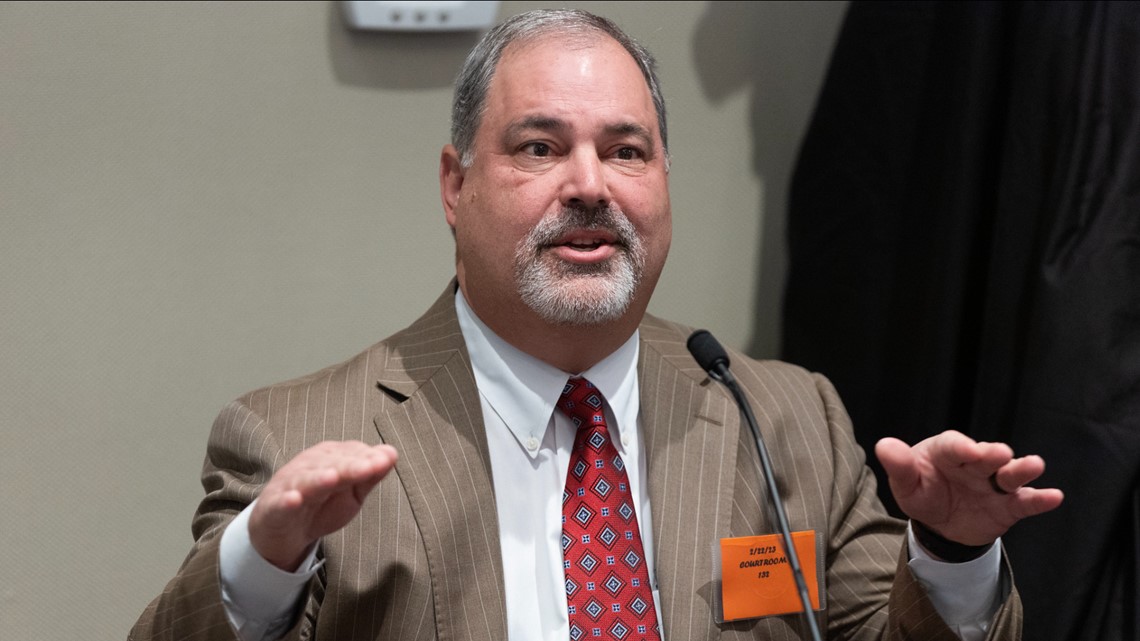
Griffin asks Ball if he thought Alex was going to go out and kill a family member? Ball said his idea about Alex completely changed after his financial issues came to light. As time passed, looking back over the course of things, Alex isn’t the person Ball thought he was. When someone does something criminal – torn down a legacy law firm, all that Ball has known professionally – when it comes to that, Ball is mad as hell but isn’t saying Alex did what he’s accused of. Alex’s actions make you rethink everything.
Were you aware Alex had $12M in life insurance? Ball responds, No. And I’d have to see it to believe it.
RECROSS
What you know now about Alex makes you rethink everything you thought you knew about it? Yes
The money you repaid didn’t come from Alex, it came from you and the firm? Upwards of $10M, some insurance covered, but the majority was firm assets
The cases Alex worked? The money wasn’t coming to Alex until the end of the year because it was the firm’s money.
Alex covered the Ferris fees by borrowing? Yes. All but about $192K that Chris Wilson had to cover
Alex never told law enforcement he was at the kennels? Ball responds, I don’t know what Alex told law enforcement but he told me that three times.
Morris Dawes Cooke
Cooke is a lawyer, knows Alex through having cases against him before and represents him in the boat accident case. He joined the civil suit in January 2020 after another lawyer became ill.
Cooke says the negligent parenting claim is the basis of the suit after Paul used Buster’s ID to purchase alcohol and Alex and Maggie allowing Paul to use the boat. Cooke thought the claim was defensible.
Cooke said in June 2021, the financial exposure was unknown. There were some insurance questions. There were motions pending – Parkers wanted to change venue and wanted to change their plea, motions to compel had been filed against Parkers and Alex.
Cooke recognizes the motions in court and explains the interrogatory requests filed against Alex. The objections to the financial discovery are normal, and discovery is meant to worry defendants. Objections are meant to be a bargaining tool.
Cooke said Alex was cc’d on emails to the defense team.
April 2021, Cooke made a Zoom conference call regarding the case to orient Cooke and go over upcoming motions. It was Cooke’s impression that Alex faced the possible venue transfer – the defense team wanted the case to stay in Hampton County – and because it was a water accident, Parker wanted admiralty laws considered.
The motion to compel was scheduled to be heard May 10 but continued to June 10 because of illness. Cooke did not think the motion to compel about financials would come up on June 10 and thought Alex’s ability to cover a settlement was not a threat.

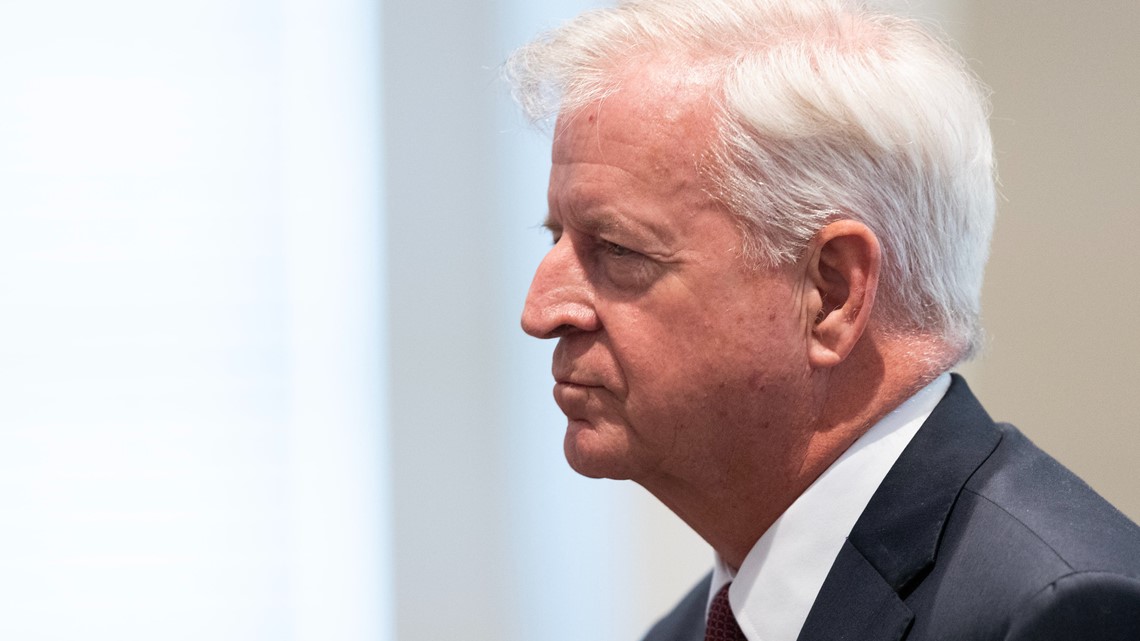
Cooke is aware an order was issued in the motion to compel. John Tiller, another one of the lawyers on Alex’s defense team, was to get the financial information and schedule a court date later about the motion on the financials.
Did Cooke expect a cataclysmic event on June 7 that would cause Alex to turn over financial information? No
CROSS EXAMINATION by Waters
The motion to get financial info was to worry defendant? Yes
Were you at the conference when Alex towered over Tinsley about the boat case? No, I was not there.
You filed a motion to appear in May 2021? Cooke was representing others at the time and had to resolve conflicts of interest.
Asked about Alex’s insurance policy, the defense team said the Philadelphia policy wouldn’t cover the claims? Yes
In May and June 2021, you were just getting on defense team, you didn’t know about Alex’s true financial status? That he’d been stealing? No
You understand when the murders happened and there was a continuance? There was an agreement for continuance
In a civil case, discovery will still happen as the case goes on if the claim will not be successful? Yes.
If the hearing went forward, there could have been an order to compel? Yes, ultimately the judge would have decided.
REDIRECT
If the judge had ordered documents be turned over, would Alex have to turn over documents immediately? No
RE-CROSS
If the judge had ordered the documents, it would have started a process? Yes
Kenneth Zercie
Zercie is a retired police detective, currently as a crime scene reconstructionist and professor at Henry C Lee Institute at University of New Haven in Connecticut. Expert in fingerprint and imprint (footwear and tire tracks) analysis and crime scene examination.
Harpootlian shows a Powerpoint presentation prepared by Zercie for the court about what could be done with crime scene evidence at the scene and later in the lab.
Zercie says for all types of evidence, photography is key to show evidence at the scene. Photography must be taken in a certain way, with certain guidelines so examinations in the lab can be done – FUSS – fill the entire image to maximize detail, mid-range, and wide angle; with scales to show proportions that can be recreated later to show size and use for elimination; use side lighting to show details in 3-dimensions; take multiple shots at different exposures. The film plane (camera lens) must be perpendicular to the evidence to diminish distortion for a more accurate rendering and analytical purposes. Use a tripod to steady camera at the same angle to the evidence.
Zercie has followed the FUSS procedure since the 1970s.
Zercie is asked to identify photos he took at a crime scene in New York. One photo shows a kitchen with latent shoe prints after Zercie used a chemical treatment and lighting to help make the prints more visible. The second photo shows the tripod used to take the photos – one option was to photograph and take up the floor. Another photo shows a scale on the floor to show scale. Zercie says some reagents react differently due to sensitivity.
Harpootlian asks Zercie to talk about crime scene processing. A video of the Moselle scene is shown to the jury. It is compiled of body cam footage at the scene, including a shot of a sheet covering Paul’s body. Zercie says a plastic tarp should be over the body because of the weather. The covering should be logged and analyzed because of physical contact between the covering and the body and there may be trace evidence on the covering.
Zercie notices no protective coverings on the shoes of law enforcement personnel and one of the officers entering the feed shed. Coverings should be used to reduce contamination of the scene and contamination of the investigating officers.
Officers can be heard discussing Alex had a shotgun with him and it had been secured in a vehicle.
A second body cam video shows the view from inside the feed room.
Zercie says he read records in the case and did not note the sheet was kept or analyzed. Paul’s clothes should have been analyzed for gunshot residue. The documents provided to Zercie, he testifies the report has no indication Paul’s clothing was analyzed. Zercie said he would have saved the sheet and clothes, bagging and tagging the items separately to diminish cross-contamination.
Zercie says he would do the same for Maggie’s clothing as well.
Zercie identifies a report from SLED Agent Worley about the feed room crime scene. Based on her experience, a pattern similar to Paul’s shoes are present as was a pattern similar to a law enforcement officer. Zercie says he wouldn’t have entered the feed room but worked from front to back in the enclosed space. He said he would do detailed photography, wearing protective covering and build a temporary bridge to stand on to preserve the area. Once the photos were done, Zercie would determine if chemical processing is necessary and proceed from the back to the front using a chemical agent to raise trace evidence. Next, Zercie would take overview photos of what investigative work was done. Then make sure photos are clear and usable and take blood samples from the area. Zercie says he saw no documentation samples of the blood in the feed room were taken.

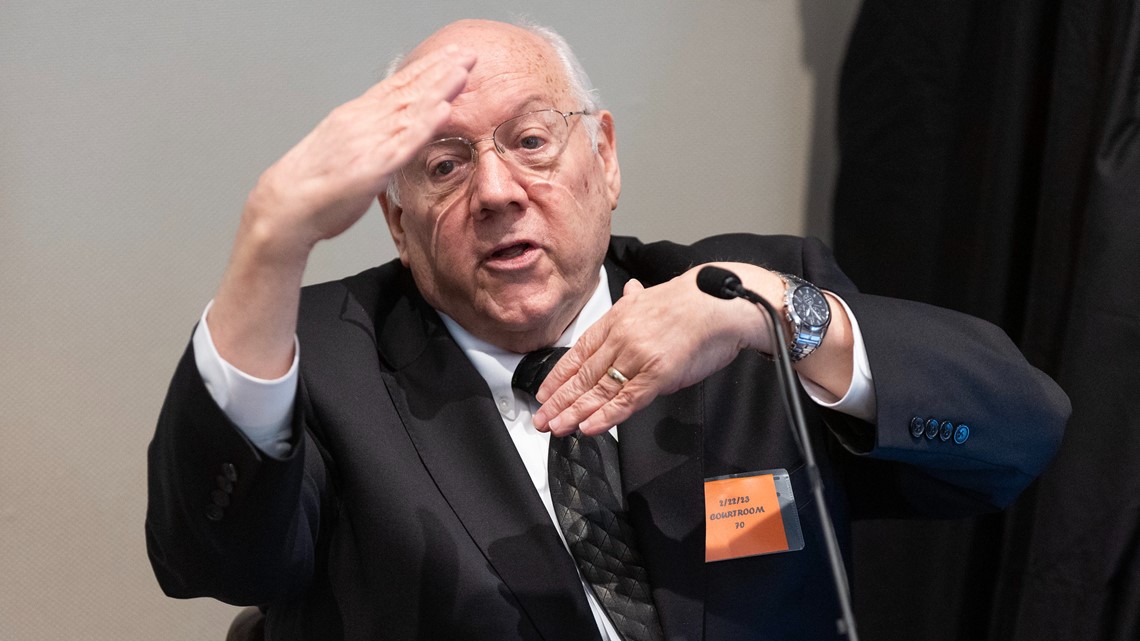
Harpootlian puts up a photo of the door to the feed room. Zercie says he saw no evidence anyone processed the door for fingerprints and explains how he would have handled the situation using alternate light sources and chemicals to look for trace prints. Zercie may have even taken the door to the lab to process. Zercie says, to the best of his knowledge, using documents given to him, he saw no effort to identify fingerprints anywhere on the Moselle property.
Zercie identifies a photograph of multiple footprints rendered for 3D analysis, taken by Solicitor Stone. Zercie said some of the footprints could be comparable to Maggie’s shoes from that night. The shoes/footprints were going in two directions, on top of other footprints in the area, Zercie says.
Zercie has reviewed the SLED manual was well written and thorough, had description about all departments, laboratories, and job descriptions. Zercie said SLED also had a technical manual explaining procedures at the scene.
Harpootlian asks Zercie which of the photographs met the standard to do a tread comparison? None.
Based on the reports, what effort was taken to take fingerprints? None
Zercie says there is much more work that could have been done at the crime scene. Zercie doesn’t know the limitations and the training of the personnel at the scene.
Harpootlian asks if SLED did an adequate job at the scene? Zercie replies no, much more could have been done.
CROSS EXAMINATION by Meadors
Meadors asks Zercie if he would have loved to be Laura Rutland? Zercie does not know who Rutland is.
Meadors says Rutland was one of the investigators on the case… the investigator who found Maggie’s footprints.
Zercie said he was given access to photographs at the coroner’s office, SLED, images by Solicitor’s Office, copies of the autopsy and some of the fingerprint section of the report, and SLED operations manuals, not the entire case file. He did not read all of the records in this case, he was not given all of the reports. He received some of the reports two or three months ago and some more documents this morning.
Zercie does written reports in most cases, it was not requested in this case as his testimony was relating to procedures used. He said he took handwritten notes but did not create a report and his notes are not with him.
Prosecution asks when Zercie prepared two Powerpoint reports… Zercie said last night.
Meadors asks if Zercie is second-guessing the Colleton County Sheriff’s Department, SLED, and other agencies. Zercie said he was there to testify on procedure, not competence, and he was handed photographs to interpret the procedures used in the case.
Meadors asks if Zercie had been to the crime scene? Zercie said it would not be important for him to go to the crime scene because, as a scientist he only looks at the information placed in front of him.
Meadors asks Zercie if Harpootlian said the photos were taken on June 7? Yes
Did you know the photos were actually taken on June 8? Evidently the person attaching the letter to the evidence was mistaken. Zercie is paid airfare and $300 per hour, and has logged 20 hours, plus today in court on this case.
Zercie is asked to compare two photographs. Both show similar treads on the footwear and says the two images were not recorded properly.
Zercie recognizes documents containing photographs of the crime scene and a report. Photographs taken of Paul’s and Alex’s shoes taken at the SLED lab and tests to take impressions from the shoes. Zercie says that is standard procedure to determine unique treads on the shoes.
Zercie says he agrees with Worley’s report and the limitations she notes in her report that were placed on her while doing the analysis on the footwear. He says she did a good job, considering the circumstances.
Meadors asks Zercie to read Worley’s report – from the examination worksheet, Worley’s notes compares footprints near the feed room and details of the tread and the consistency of the similarity of the treads on shoes worn by Paul that night. The report also notes a more meaningful conclusion could not be made because of lack of clarity in the photographs taken at the scene.
Regarding the impression on the back of Maggie’s leg, Zercie also agrees with Worley -- she could not determine a pattern on Maggie based on the lack of clarity.
Of the area behind the feed room door, Worley’s report concluded the footprints in the feed room were consistent with Paul’s shoes.
Meadors said Worley was able to analyze the footprints around the kennel and inside the feed room and create a report. Zercie says that is correct
You have no idea if the reports not given to you show SLED did things correctly? Zercie responds he has no idea
REDIRECT
The photo of the shoe impressions… if there were prints on top of the impressions would that be good procedure? Zercie said no, but he has no idea since he wasn’t at the crime scene
Harpootlian said Zercie was asked if Worley did a poor job because investgators at the scene didn’t follow standard procedure. Harpootlian continues, if Worley had followed the procedure Zercie followed in New York, would there be more information available? Zercie cannot know when the footprints were put there.
Could Worley have tried harder, done more? Zercie said possibly, she or someone in her team that was trained to do so.
Would Zercie have used the word “consistent” when writing the report on the footprints? Probably not
RE-CROSS
Did Zercie do a comparison on the treads? He did, he says, there was another report.
Where is the report? Zercie responds, they decided not to use it.
Barbara Ann Mixson
Mixson is a housekeeper for Libby Murdaugh, working for her for 41 years (she is 71). She knows all of the Murdaugh children and knew Maggie, Buster, and Paul.
Mixson said she talked to Maggie every day and saw Paul every week. Mixson said Alex would go by Almeda every day while she was working. Mixon works 8 a.m. to 3 p.m. She took a break from February to August 2019 when her husband died.
Mixson said Maggie would come on the weekends, Alex would come during the week.
She remembers talking to Maggie the evening of June 7. Maggie told Mixson she was going to make dinner for Mixson and her family.
Mixson said she called Alex on the afternoon of June 7 and told him Libby was agitated and to come check on her later that day. Libby was agitated because her husband Randolph was back in the hospital.
Griffin asks to verify the time of the call from the call logs – around 3 p.m.
Mixson said her daughter was with her when police officers came to her home and told her about Maggie and Paul.

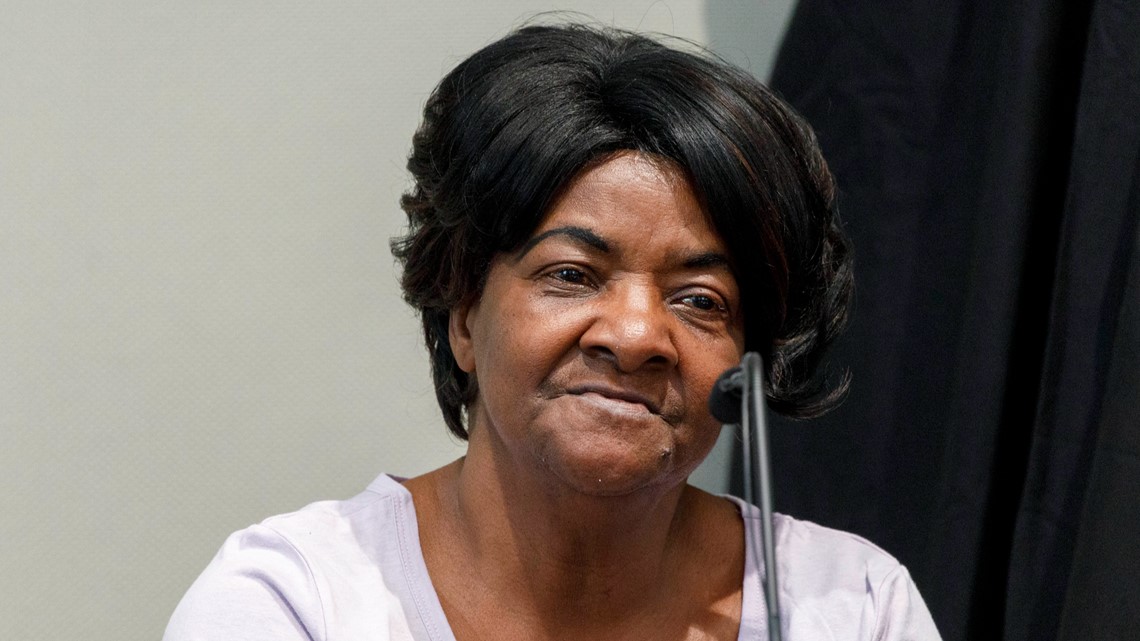
Mr. Randolph passed on June 10 and his funeral was Sunday. Mixon said she went to work at Almeda on Monday, relieving Shelly Smith at 8 a.m.. She worked Tuesday and Wednesday, coming in at 8 a.m., relieving Smith.
Mixson said she never saw a blue tarp laid out in the house.
CROSS EXAMINATION by John Meadors
You said the Murdaughs are like your children? Yes
Remember when we met a few weeks ago? We had a conversation? Yes
You didn’t mention the conversation you had with Alex when we talked. Meadors asks Mixson when was the first time she told defense counsel about the conversation she had with Alex? Mixson cannot remember.
Micah Sturgis
Sturgis, a former Cleveland County (NC) Sheriff’s Office detective, is a digital forensic examiner for Barefoot Professional Investigations and certified in Cellbrite Digital Evidence. Sturgis has performed cell phone and computer live and forensic data extractions.
Sturgis is being paid $300 per hour for consultation and $600 per hour to be on the stand.
In this case, Sturgis has reviewed reports provided by the State – extractions of mobile devices and the reports generated from the data. Sturgis has not done independent extractions.
Sturgis found the timelines to be accurate, with two instances of items in the Knowledge-C data that are not in the timeline.
With Paul’s phone, there wasn’t too much data after 10 pm.
With Alex’s phone, Sturgis focused on steps recorded.
Sturgis focused on Maggie’s phone.
Sturgis explains Faraday bags keep electronic devices secure from outside manipulation and Ramses boxes are where Faraday bags are kept for another level of safety, where the phone can be manipulated but still kept safe within the Faraday bag.
A photo of Maggie’s phone in the lab before extraction is recognized by Sturgis.
Sturgis recognizes a report of Maggie and Alex’s steps recorded from the Apple Health data and these documents are entered into evidence. Sturgis explains how steps are recorded: an accelerometer inside the iPhone records a step anytime the phone is jostled and records distance by using GPS coordinates.
Sturgis says on the iPhone, steps are more accurate than distance information. The totality of data is what needs to be looked at for an accurate record of events.
Orientation changes (to or from portrait or landscape) are logged when the orientation of the data presentation changes, making data easier to be read by the holder of the phone. On Maggie’s phone, the last orientation change was just after 9 p.m.
Sturgis said orientation changes cannot occur if the screen is locked or the phone is off. When the screen is backlit, the orientation change can be made. Motion can turn on a screen’s backlight.
Sturgis said Apple has a raise-to-wake feature on iPhones where the screen will light up when the phone is raised, and on Maggie’s phone the feature was turned on.
Sturgis reviewed the Suburban’s position as it passed the location where Maggie’s phone was found around 9:08 and again around 9:50. Sturgis says very little motion is needed to turn the screen on and the database indicated during that time, Maggie’s phone was off.
Sturgis recognizes a printout of the Powerpoint presentation of the data pulled from Maggie’s phone from 8:49 to 9:07
8:49: last message read, phone locked and remains locked
8:53: backlight comes on
8:53: steps recorded, Siri usage indicated, orientation change completes, phone goes dark, comes back on, goes back off
8:54: backlight comes on, camera use starts according to Knowledge-C database. Sturgis says if he follows the data, he gets a key number that relates to a camera function on the lock screen that allows camera operation while the phone was locked. Then camera ends one second later.
8:54: five seconds later, orientation to landscape ends
8:55: backlight on and orientation to portrait begins, stops logging 59 steps
9:03: backlight on
9:04: missed call from Alex, backlight off. Sturgis said backlight goes off when phone is turned off or flipped the phone over
9:04 light back on
9:06 incoming call from Alex, orientation change ends
9:06, another incoming call from Alex
9:07 light off – Suburban is traveling from Moselle to Almeda, in the Moselle driveway.
CROSS EXAMINATION by John Conrad
Sturgis testifies data from June 9 could have been kept if phone was stored properly.
Apple iOs keeps databases separately? Yes
Do you know how long Maggie’s phone would have stored GPS information? No
Sturgis demonstrated orientation. Do you know the current version of Apple iOs? 16 something
And on Maggie’s phone? 14 something
Changes of sensitivity can change with iOs? Yes
Were you aware of a change in version 15 that changed way orientation was recorded? Not aware
Sturgis reviewed Paul’s phone, but doesn’t recall last time Paul’s phone was active – Conrad says it was at 8:49 p.m.
Maggie’s phone locked at 8:49 and not unlocked until recovered by law enforcement.
Sturgis reviewed Alex’s phone.
Did he find steps recorded between 8:09 and 9:02? Sturgis doesn’t recall
Paul and Maggie’s phones locked around the same time, and Paul’s remained locked until the battery died around 10:34 p.m.
After 8:49, no use is recorded on Paul’s phone – no user interaction.
Most likely explanation for orientation change is human interaction? Yes. Or if phone is in one orientation and then falls and lands in another position
Three orientation changes in a row can be caused by a fall? In a person’s hand and being turned, jostled in a person’s pocket are things Sturgis believes would cause changes.
8:53, steps recorded on Maggie’s phone, but Sturgis cannot say who was carrying her phone. Siri usage is either by squeezing side button or saying, “Hey Siri.”

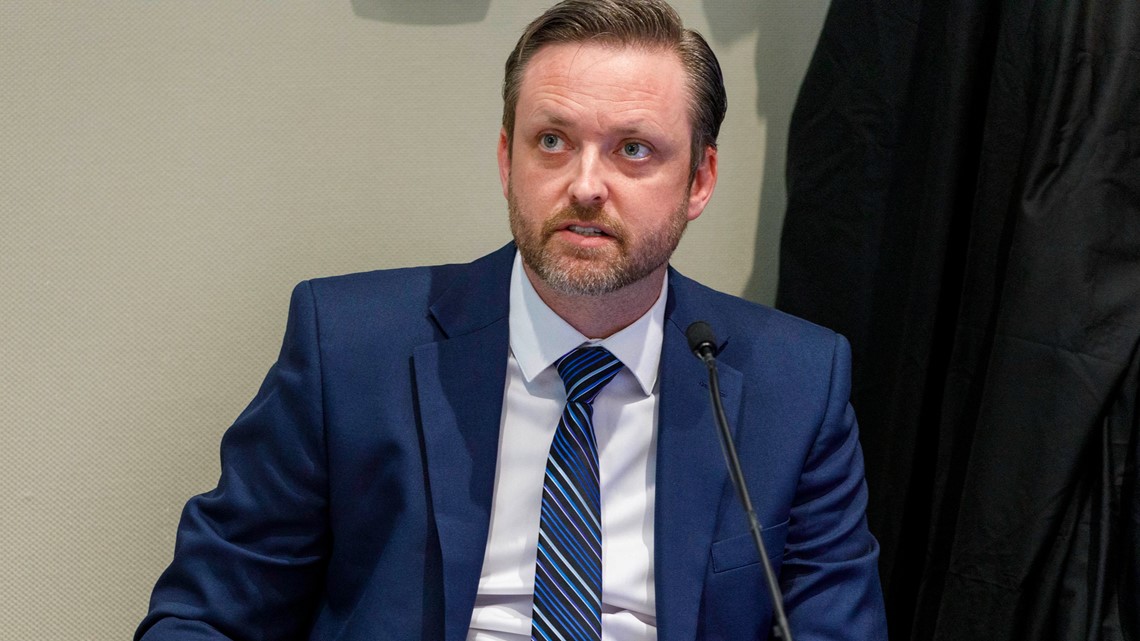
8:54:34, camera activated, someone probably swiped the screen or touched the bottom of the screen; camera use ends one second later. Sturgis believes no one would be taking a picture in one second. Likely someone handling the phone between 8:49 and 9:03. There is a gap before 9:03 where there is no activity at all.. the phone is possibly in a vehicle or ATV.
9:04, Alex’s call comes in, screen off – likely done manually
9:07, backlight off and stays off until 9:31. Alex’s vehicle starts to move at 9:06 from Moselle house. Sturgis doesn’t have a version of iOs that was in Maggie’s phone.
REDIRECT
Sturgis says raise-to-wake is separate from orientation
Any reason Maggie’s raise-to-wake is different from a more recent version? No
Screen was off when Alex passed location where Maggie’s phone was found? Yes
No picture was taken when camera was activated? No. Sturgis says it was a user interaction with the device.
There has to be some movement to change orientation? yes
Someone running with phone can change orientation? Yes
Sturgis recognizes the GPS data. There could have been GPS data from June 7 if phone was placed in a Faraday bag.
Are Alex’s steps… any steps corresponding between Maggie and Alex’s phones? No
The steps recorded on the phones are almost identical, not a significant difference across a distance traveled.
Sturgis said he cannot tell what happens if a phone is tossed out of a window but can show how easily the phone can turn on.
RECROSS
Any data to say the video on Paul’s phone taken at the kennels was not recorded at 8:49? No
Persons can stop and start during steps recorded? Yes
You can’t tell if Alex’s phone stopped over four minutes while his phone records 240 steps? Sturgis cannot. Based off what Sturgis sees, there is a three-minute gap, but short stops might not be recorded.
Actual steps more accurate than distance covered? Yes. Sturgis said location in the phone and GPS data can differ.
Testimony resumes at 9:30 a.m. on Thursday.
You can find trial updates here every day. Watch live streaming testimony and coverage on wltx.com, on the WLTX+ streaming app on Amazon Fire and Roku TV, and on the News19 WLTX YouTube page.


